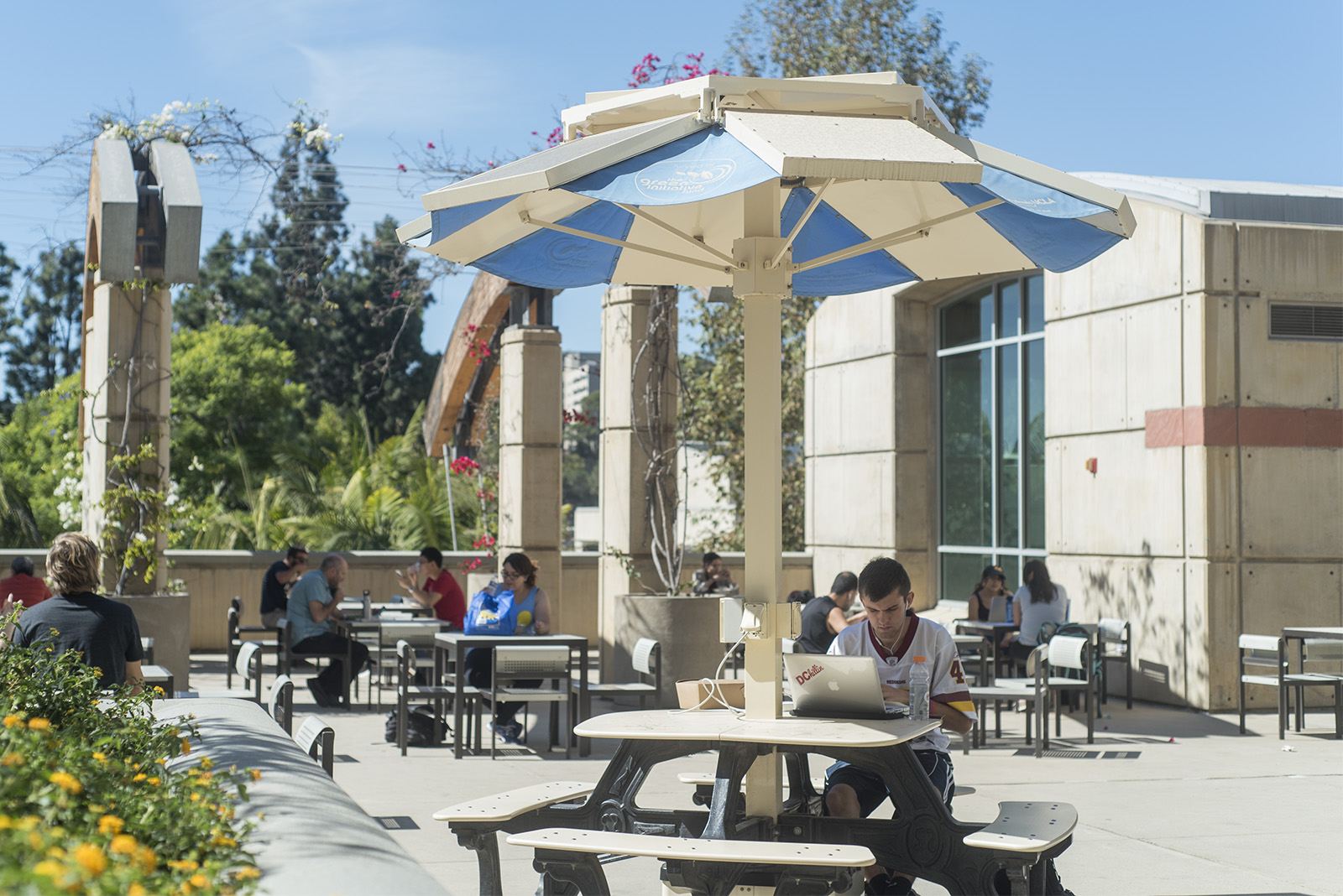Guillaume Kosmala: UCLA administration lacks coordination on sustainability projects

The USAC Facilities Commission is planning to install solar umbrellas on Kerckhoff Patio, similar to the ones currently in place by Ackerman Union. However, they could compete for use with nearby power outlets installed by Facilities Management. (Miriam Bribiesca/Photo editor)
By Guillaume Kosmala
Nov. 20, 2016 7:41 p.m.
While the UCLA community voted overwhelmingly Democratic, 62 million U.S. citizens voted for a president who claims climate change is a hoax created by the Chinese. Now more than ever, local progressive leaders of environmental sustainability need to take bold steps, and it is frustrating to see that the UCLA administration, which needs to be one of these leaders, is experiencing communication issues that are leading to poorly coordinated projects.
The Undergraduate Students Association Facilities Commission announced plans last month to install solar umbrellas on Kerckhoff Patio and in the John Wooden Center this year with the Green Initiative Fund referendum, which allocates about $300,000 to environmentally sustainable projects. At the same time, the Office of Instructional Development and UCLA Facilities Management planned to install several study benches with power outlets in the space during spring quarter, and completed the project this fall.
The obvious overlap between the two projects raises a question familiar to UCLA culture: How could this have been done better? The Facilities Commission and Facilities Management did not collaborate on this project – or projects in general –which leads to counter-productive decisions and opportunities for mutual aid being missed.
UCLA Facilities Management and USAC Facilities Commission should work together on their projects to ensure efficiency, efficacy and fiscal responsibility. And the first step to make this synchronization happen is for both groups to be more communicative with each other.
The goal of the Powell study space was to provide an “outdoor (study) space with power and internet,” according to Robert Rodgers, manager of the Office of Instructional Development. But this is problematic because by adding extra power outlets so close to Kerckhoff Patio, the UCLA Facilities Management will be competing with the solar umbrellas the Facilities Commission plans to install there, and the umbrellas will compete with the Powell study space. In effect, the two administrative bodies are bumbling about, stepping on each others toes in a commendable but ineffective attempt to improve facilities on campus and environmental friendliness.
If the solar umbrellas had been placed in the Powell study space, the USAC Facilities Commission and UCLA Facilities Management could have engaged in a win-win-win collaboration. The study space could have used its sustainability as a marketing tool to make more people aware of its completion, the umbrellas would have garnered more users due to the novel nature of the study space and students and faculty would have been able to take advantage of a sustainable, high-tech outdoor study space right by Powell Library.
Instead, the phone-charging umbrellas will be placed in Kerckhoff, and the laptop-charging umbrella will be place in the John Wooden Center. The fact that the laptop-charging umbrella is being installed on John Wooden Center’s second-floor balcony represents a major failure in communication. If it had been installed in the Powell study space, it would have been much more popular simply because not a lot of people know about the second-floor balcony of the John Wooden Center – especially as a study space.
USAC Facilities Commissioner Sandra Rhee stated that the commission was not consulted even though she wishes they could have worked together to see if the opportunity for sustainable, perhaps solar-charging benches was possible. In fact the most the commission even heard about the process of the installation was from the Daily Bruin article. Had there been better communication, USAC would have certainly considered placing the umbrellas in the Powell study space. Facilities Management simply did not coordinate well enough with the student body, and that has to be rectified in future projects. The first step to this is for them to be more communicative. It is inexcusable that the commission was not even consulted once about the project. In the future UCLA Facilities Management should set aside time to meet with the commission and work out ways to coordinate better.
However, it’s unfair to place all the blame on UCLA Facilities Management. USAC officers are elected and paid $7,560 each year for their positions so we should expect more from them. They should have reached out to Facilities Management once they had read about the project in the Daily Bruin and tried to push for the umbrellas being placed in the Powell study space.
Nurit Katz, chief sustainability officer of Facilities Management, stated that she had been discussing “interesting projects” with the USAC commission and that she looked forward to working with them in the future. But until they actually sit down and work out plans together, “the future” won’t come.
To be fair to both Facilities Management and the Facilities Commission, it’s difficult to organize both parties: They’re both quite enormous and they are running on limited budgets. Katz stated that the reason the solar umbrellas were not considered for the Powell outdoor study space was because of the limited budget for the project. However, that seems counter-intuitive since working together would have allowed for part of the project’s costs be covered by Facilities Commission’s TGIF budget. Working together would help pool resources and keep both of them from being redundant in the future.
Sustainability is a key issue nowadays and the only recourse left to make sure that climate change is tackled is through local and state initiatives. TGIF is a great way to continue local efforts to tackle sustainability, but if the projects it supports are not visible then the whole purpose is defeated, and it may be counter-productive as students may decide that they no longer want to increase their tuition for a program that they will inevitably see as inefficient.


